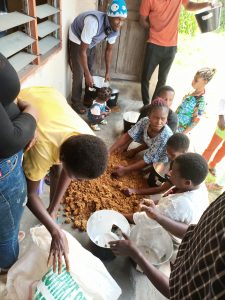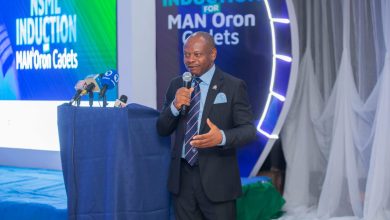Niger DeltaOil & GasSociety WatchTech
PPDF Inaugurates Three New Environmental Clubs in Ibeno
...As Community Gets Training on Environmental Justice, Sustainability
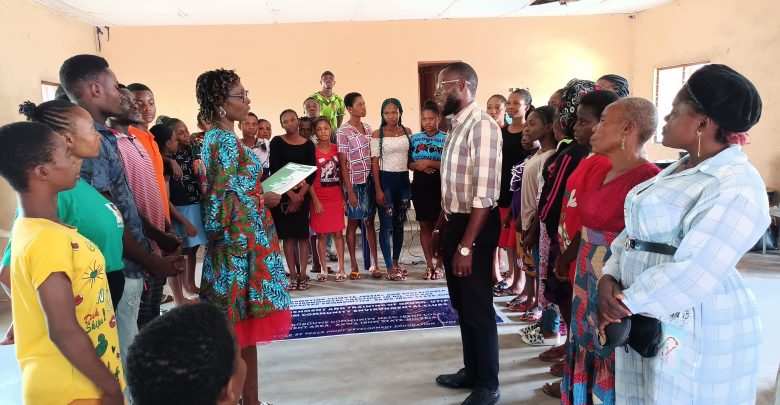
By Ekemini Simon
Three communities in Ibeno local government area, Okoroutip, Iwokpom and Opolom have joined other oil and gas impacted communities in Akwa Ibom State to own an environmental club towards designing programmes that will promote climate justice and sustainable environmental practices.
The new environmental clubs were established courtesy of Peace Point Development Foundation, PPDF with support from Energy Transition Fund (ETF).
The inauguration performed by the Director, Climate Change, Akwa Ibom State Ministry of Environment and Solid Mineral, Mrs. Ini Umoh took place at Okoroutip Community Hall on Friday, July 1, 2022.
The three new clubs had about a hundred volunteers drawn from the three communities.
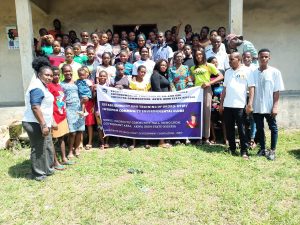
The event further witnessed the training on how to produce a fuel wood efficient stove, and training on Environmental Monitoring and Protection.
In his opening remarks, the Coordinator of Peace Point Development Foundation, PPDF, Mr Umo Isua-ikoh said the establishment of environmental clubs is geared towards equipping members of oil and gas communities with insight and strategies on how to promote and address their peculiar environmental issues.
He said ” It is time members of communities wake up and become more interested in their environmental issues and intentionally work towards conserving their environment.
” God is an environmentalist and a conservationist. He showcased this during Noah’s day. As His intelligent creatures, we must imitate him. Environmental Clubs as this offers a needed platform for your environmental challenges to be addressed.
Isua-ikoh pointed out that the training and the environmental club will aid the communities work collectively to readjust some ill environmental practices and most importantly protect their environment against the exploitative and hazardous tendencies peculiar to oil and gas communities.
The Coordinator offered insight to the fact that the three new environment clubs in Ibeno births a total of 10 environmental clubs established in the oil and gas communities of Akwa Ibom State courtesy of PPDF.
While noting that there will be collaborations in the future, the PPDF helmsman charged each inaugurated club to come up with action plans and programmes that will promote environmental justice in their domain.
At the training, the Director, Climate Change, Akwa Ibom State Ministry of Environment and Solid Mineral, Mrs. Ini Umoh while speaking on Environmental Protection, Climate Change/ Mitigation at Community level and available opportunities for linkages with Regulatory Authorities, charged the community to desist from environmental practices that does not give thought about the future.
She mentioned some of the practices that give rise to climate change to include deforestation, indiscriminate disposal of plastics and burnings.
The Director urged the communities to engage in environmental friendly activities and report observed environmental misnomer to relevant Non-Governmental Organizations, government agencies and the media.
On his part, Multiple Award Winning Journalist and Environmental Crusader, Ekemini Simon during his presentation on the theme ” The Rules and Regulations of Community Environmental Monitor and Leadership Skills”, highlighted Environmental laws the Environmental monitors must be acquainted with in order to uphold environmental justice in their domain to include; Section 20, 12, 33 and 34 of the Nigerian Constitution of 1999 as amended, National Environmental Standards and Regulation Enforcement Agency ( NESREA) Act 2007, Environmental Impact Assessment (EIA) Act 2007 and Harmful Waste (Special Criminal Provisions) Act 2004.
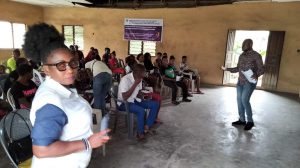
Others are Hydrocarbon Oil Refineries Act 2004, Oil Navigable Water Act 2004, Associated Gas Re-injection Act, 2004, The Endangered Species Act, 2004, Inland Fisheries Act, 2004, Oil Pipelines Act 2004, and Niger Delta Development Commission Act 2004.
The facilitator noted that the social, economic and political costs of failing to detect and deal with environmental problems in the early stages can be enormous, hence the need to take action.
Simon added “Economically, correcting problems after the environment is seriously degraded adds to the cost. Yet, some degradation may be irreparable: Living resources may be so depleted and habitats so damaged that stocks of commercially and recreationally important species may never return to pre-degradation level.
” Public health problems can arise with attendant economic and social consequences. Public opposition and anger may increase with sudden news that our source of livelihood is no more”.
He recommended some of the actions that Environmental monitors need to take to include alerting the community, relevant state agencies, concerned NGOs, press and companies of environmental incidents and the location it takes place.
Other recommendations include that the communities should demand immediate clean up of the populated areas using the Environmental Impact Assessment (EIA) and relevant legal documents as backup.
He added that for polluted areas, Environmental monitors need to alert community leaders on the need to pose warning signs warning the community about the pollution thus helping people avoid consuming food from the polluted area.
Simon, who stressed that the Environmental Monitors need to develop leadership skills such as effective communication, decision making and Strategic Management skills said these skills will guide them in taking actions after they may have discovered issues that may not enhance environmental healthiness.
In response, the Youth Leader of Okoroutip, Nsoh David on behalf of the three communities thanked PPDF for the many environmental training offered the community.
He said that the communities will take to heart what they have learned and take adequate action to save their environment from hazards.
Meanwhile, PPDF used the occasion to train more people on how to produce a fuel wood efficient stove. The communities who took active part in the training appreciated PPDF for the technology transfer and promised to make good use of the technology.
